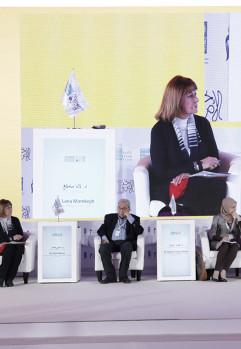Adult Education from the Perspective of Continuous and Lifelong Learning
Lifelong learning is now a necessity, asserted panelists on day one of the inaugural Literacy Challenge Forum, in a session that explored ‘Adult Education from the Perspective of Continuous and Lifelong Learning’.
The Forum organized by the Mohammed Bin Rashid Al Maktoum Knowledge Foundation (MBRF) was held on February 24 to 25, 2020. Moderated by former Jordanian Minister of Culture Dr. Lana Mamkegh, the session brought together Dr. Sami Nassar, a Professor of Education at Cairo University’s School of Graduate Studies of Education; Dr. Najoua Fezzaa Ghriss, a Professor at Higher Institute of Education and Continuous Training at the University of Tunis; Dr. Latifa Al Falasi, Arabic Language Expert at the UAE Ministry of Education; and Dr. Amal Al Habdan, Consultant at King Salman Humanitarian Aid and Relief Centre.
Dr. N assar e xplored t he m ain c hallenges f acing a dult education in the Arab world, most notably the growing population, which is estimated to reach nearly 468 million by 2025. Other challenges included the new economy – driven by the knowledge economy, new and emerging professions, and jobs going obsolete – in addition to political conflicts and the refugee crisis which have affected more than 45 million people across the Arab region where 13 million youths and children were forced out of school.
For her part, Dr. Najoua Ghriss explained that any evaluation of an adult education program must be conducted against the strategic objectives stated at the beginning. “Adult learning programs set grand strategic objectives, but the evaluation at the end is generally limited to whether the participants learned to read and write.”
Dr. Ghriss made reference to a new UNESCO study that is developing new tools that go beyond reading and writing to include academic abilities to measure literacy levels. Several African countries, including Tunisia and Morocco, are part of the study. “Every time a new discipline or scientific field is born, in parallel, more illiteracy is created, because illiteracy means more than just lack of reading and writing skills,” said Dr. Latifa Al Falasi, citing flexibility as a prominent quality that adult learning systems must include. “Academic systems in the UAE are flexible and seek to offer students education that meets their needs. This includes flexibility in schedules, remote education options, the earned credit system, and diverse education pathways.”
Dr. Amal Al Habdan underscored the Kingdom of Saudi Arabia’s firm belief that the future of countries plagued by conflict and disasters lies in education.
“Education in cases of emergencies is indispensable for overcoming difficulties and achieving stability, progress, and prosperity,” Dr. Al Habdan said, showcasing the King Salman Humanitarian Aid and Relief Centre’s strategy, which revolves around three pillars beginning with strategic partnerships to achieve the 17th sustainable development goal (SDG), strengthening the means of implementation and revitalizing global partnerships for sustainable development.








